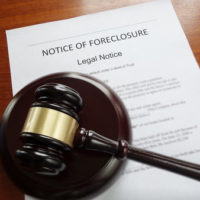Deed In Lieu Of Foreclosure

There are several ways a homeowner can try to avoid foreclosure proceedings or a final judgement of foreclosure in Pennsylvania. One way that the homeowner can avoid the damaging impact of a foreclosure is through a deed in lieu of foreclosure. While this process can give the homeowner a way out of a difficult financial situation, the homeowner has to be careful when navigating the process to ensure that he avoids owing money when it is completed.
When a homeowner goes through a deed in lieu of foreclosure, he makes an agreement with the mortgage lender in which he will hand over the deed to the property to the mortgage lender in exchange for the mortgage lender discontinuing foreclosure proceedings and cancelling the loan. Once the mortgage lender has the deed, it can arrange for the sale of the house to offset the loan.
As with short sales and foreclosure sales generally, if the house is sold for less money that is owed in the loan, the mortgage lender may require the homeowner to pay the difference, which is known as a deficiency. In order to collect the amount of the deficiency from the homeowner, the mortgage lender has to seek a deficiency judgement against the homeowner. As part of this process, the mortgage lender must prove that the home was sold at a fair market value.
There are advantages and disadvantages to a deed in lieu of foreclosure, and the decision to pursue this should be made after consultation with an experienced attorney. The deed in lieu of foreclosure is noted on the homeowner’s credit report, however, it is a more favorable notation that one of foreclosure. In addition, the deed in lieu would halt the foreclosure proceedings if they have begun, and end a long protracted wait for the homeowner to lose his home. The homeowner can negotiate for the mortgage lender to forgive the amount of any resulting deficiency, which cannot be done with a foreclosure.
Unlike a short sale, the homeowner who exchanges his deed for the loan discharge does not have to go through the trouble of having to arrange the sale of the home himself. Selling a home can be a hustle, and can be extremely stressful to the homeowner.
There is no guarantee that the mortgage lender will agree to a deed in lieu of foreclosure, if the home is encumbered by other mortgages, it is unlikely that the mortgage lender will agree to a deed in lieu of foreclosure.
In cases where the mortgage lender agrees to forgive the deficiency, the homeowner is still responsible for paying taxes on the forgiven amount. If the homeowner cannot pay the taxes, the homeowner will owe money to the Internal Revenue Service.
Contact an Experienced Foreclosure Defense Attorney
If you are struggling with paying your mortgage, facing foreclosure, and seeking to negotiate with your mortgage lender, contact us at the law firm of Louis S. Schwartz, Attorneys at Law to speak to a Philadelphia foreclosure defense attorney with experience assisting homeowners avoid foreclosure or owing a deficiency.
Resource:
legis.state.pa.us/WU01/LI/LI/CT/HTM/42/00.081..HTM


